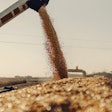
Do merchants have a secret? I have been approached more times than I care to recount with the question, “I know you don’t know, but what do you think the market is going to do?” The question is at least an insinuation that the merchant knows something the inquirer does not. While this would make for a great discussion on grain origination, I would like to take it in another direction. If not an inside scoop on the market’s direction, what is it that merchants have that allows us to keep doing what we do?
The easy answer should be that we are basis traders and not speculators. Still, beyond practice, I have observed four attributes that merchants have that takes them from merely facilitating trades to being a successful merchant. Let’s take a look.
Successful merchants are forward-thinking
Merchants understand the seasonality of grain and the need for a plan. Fortunately for me, I was trained by successful merchants who taught me early how to approach planning for a crop year. Each year in late winter or early spring, we took the time to project the next harvest season. We would look at expected harvest allocation of space, expected grain receipts and expected grain flow. The experience allowed us to look at logistical, financial and spread needs for the coming crop season.
Logistics can be tricky to predict, and no plan will be perfect, but much can be learned from them. Looking at previous seasons to see how much you typically move at harvest, what it takes to get it moved and how to manage space may keep you from making last-minute sales decisions that don’t help the bottom line. You will also serve both your farm and end-user customers better during harvest and beyond.
There is a financial benefit to a plan that often gets overlooked. Having a grain flow plan allows you to project your cash needs. It’s not good having to sell grain because you do not have the cash to carry when the market is asking. If nothing else, having a cash flow plan is an excellent resource for having the conversations you need to have with your lender. Anyone who rode the markets from 2007 to 2014 can attest to the importance of having an informed lender.
The final part of having a plan is having an idea of what your spread needs might be. An idea helps begin the process of proactively locking in a market structure that would allow you to do what is needed to provide grains to your end-user customers. This process is especially beneficial if you are carrying a regular year-round supply.
When you plan, you have a better idea of what to do and when to do it. Knowing where you are today and what is out ahead allows you to capture opportunities that the spot market or trading back-to-back does not give you. This knowledge leads us to the next attribute successful merchants have.
Successful merchants are decision-makers
When a plan gets coupled with relevant information, successful merchants are ready to pull the trigger. One challenge to this equation is identifying what is useful information and what is just noise.
Our industry has no shortage of data to digest. Some are helpful, while some not so much. A useful key to approach this issue is asking oneself if the data gives a perspective or is more speculative. Does it help me buy grain, manage spreads or sell grain?
For example, knowing historical harvest basis values, basis improvement and spread values empower the merchant to make decisions using what we like to refer to with our customers as “basis eyes.” It’s a clarity of value, opportunities and benchmarks that empower them. Successful merchandisers have an informed position and know their target values for taking action.
When exercising a plan and making decisions, merchandisers have another attribute that helps them be successful. They are disciplined to stay in bounds.
Successful merchants stay in bounds
太可怕了,欺骗他人,egregious to lie to oneself — routines, processes and guidelines aid in keeping a merchant from stepping out of bounds. Regardless of how disciplined one may be, none of us are entirely immune to the infection of confirmation bias. Establishing boundaries or action points can prevent a lot of stress and loss. Discipline keeps them in bounds.
Additionally, they not only have to hold themselves in bounds, but they also need to keep the business in bounds. It’s tempting to cut special deals or give away space to keep a customer happy. But what is the impact on the business? They must protect the value of their space. They are intentional about the contracts they write and the integrity of the agreement. They stick to grain policies like storage rates, discount schedules and position limits. This discipline gives them the best chance to gain a margin and maintain integrity with your customers.
On to one final attribute …
Successful merchants are team players
成功的商人与内部和你工作tside their organization to do their best work. Internally they work with finance, logistics and operations to make sure grain is received, accounted for, conditioned and delivered profitably. And even the smallest of functions have an external team.
They have growers, buyers, bankers, accountants and brokers they can incorporate into their team. Successful merchants put time and energy into developing and maintaining these team relationships.
Ultimately, the team brings mutual success or failure. Being part of a team is especially important in our rural communities, where successful merchants make successful businesses. These businesses not only provide services but feed families both near and far. And to me, that is too much of a secret. ■
About the Author
Dwayne Wilsonis a grain merchandising specialist with White Commercial Corp. He works with both WCC’s sales and merchandising support teams to help grain elevators across North America grow. Wilson resides in Covington, OH, with his wife and three children. He can be reached atdwilson@whitecommercial.com.





















